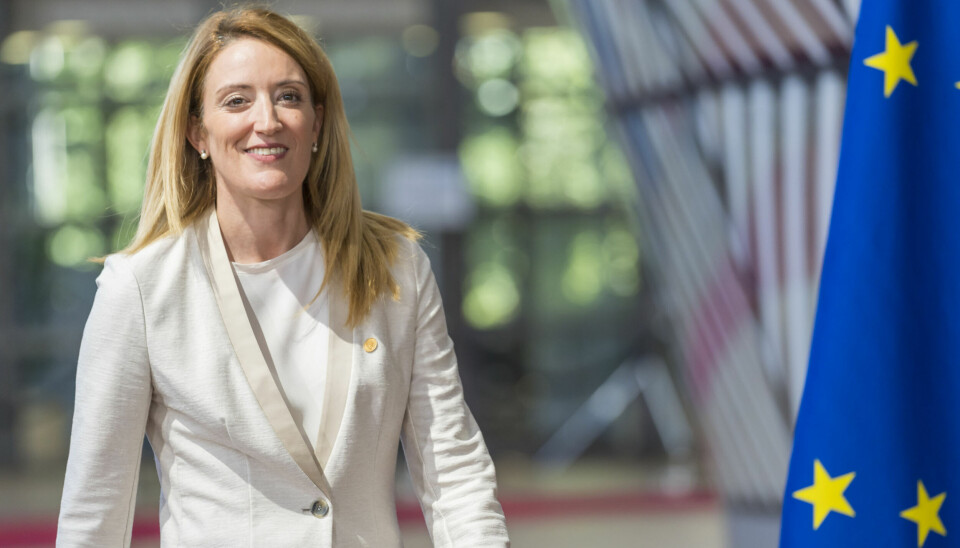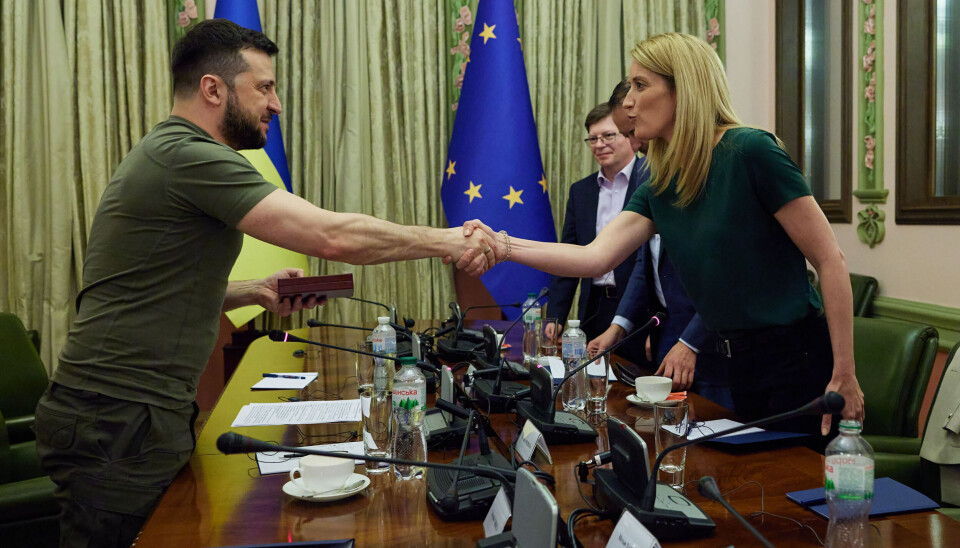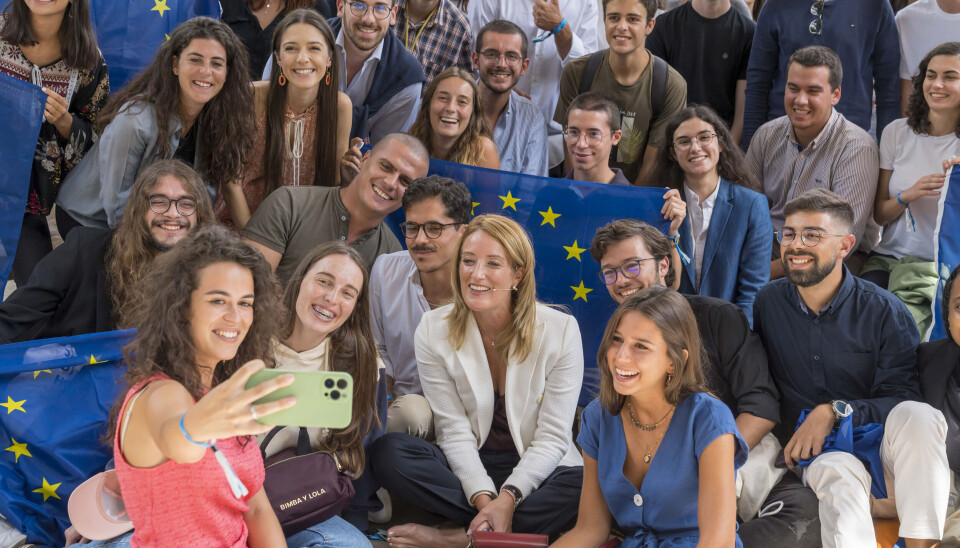NAVRAAG ROBERTA METSOLA
'Political forces suggested that it was better to leave the EU. Today, that is no longer the case'

Since January 2022, Roberta Metsola has been the president of the European Parliament. Before becoming the current president of the EP, Metsola made a substantial political career, starting as a legal advisor of the European Union (EU). Metsola is originally from Malta, one of the smallest members of the supranational partnership.
The marking of the war in Ukraine as the number one priority, the specter of right-wing populism which is haunting Europe and the current role of the EU on the world's stage: Metsola does not shy away from difficult questions.
The war in Ukraine and the energy crisis have proven that European cooperation is necessary to maintain stability on the continent. How can the members of the EU strengthen cooperation with one another as Euroscepticism and right-wing parties are rising to popularity among the continent? Roberta Metsola: 'First of all, I never expected to have war back on our continent; it has completely changed the geopolitical scenario. Ending this war, and for Ukraine to win this war, remains the first priority of the EU, and we cannot relent for a single moment in our efforts to achieve it. We need to keep supporting Ukraine: financially, politically, humanitarianly and militarily.'
'But this crisis has undoubtedly had the effect of producing a more united EU. We have responded with unprecedented speed and unity to this common threat. While supporting Ukraine, we have at the same time taken decisive steps to reduce our energy dependence from autocratic third countries.'
'The different crises that the EU had to face in the past 15 years galvanized the Union'
'As a conclusion, the EU is stronger today than it was on 24 February 2022 (this date marks the beginning of the war in Ukraine, red.). There is strong public support for our collective response. We see it in the European Parliament, where there has been a quasi-unanimity for all our decisions in support of Ukraine.'
Do extreme right wing-parties pose a threat to internal cooperation within the EP?
'A few years ago, we did see a number of political forces suggesting that it was better to leave the EU. However, today, that is no longer the case.'
'A majority of EU citizens want more EU; an increasing number of countries see Europe as a beacon of hope, peace and liberty, and want to join our Union. Therefore, I would say that instead of weakening us, the different crises that the EU had to face in the past 15 years galvanized the Union. The European Parliament is a place of debate and sometimes different views, but when it comes to the fundamentals there is a strong pro-EU constructive center.'

Critics state that the EU as an organization is inconvenient and bureaucratic. Can the EU surpass the needs of a federal government in the future? In other words, is it desirable to govern the whole EU on a federal level, such as the United States of America (USA)?
'I have quite a different view on this. I am convinced that the EU is a success story. We only have to look at everything achieved in the last 70 years. And more recently, we have overcome a serious global crisis like COVID-19 thanks to the existence of the EU.'
What are some factors that prevent the EU from working on a more efficient level?
'The differences between the EU and the US are evident; in the EU we have 27 countries with different languages, and also different political, social and cultural situations. It is not about comparing ourselves with other countries, but about continuing to work to make the EU better and stronger. It is about being honest about our successes and failures and to learn from them.'
What is, in your opinion, the cause of Euroscepticism? Have recent political issues such as the immigration, COVID-19… enforced these negative feelings towards the EU?
'There are various causes for Euroscepticism, as it is often linked to populism, the false hope of easy solutions and disinformation. However, I believe that they are not objectively justified: anyone can argue that Europe is a much better place today than it was 70 years ago.'
How can members of the EU counter Euroscepticism in their own national policies?
'I believe that we need to better communicate how the EU benefits citizens, but we also need to consolidate the constructive pro-European centre within the political arena. That is why we need leadership.'
'We need to lead the debates, not sweep them under the carpet'
'We need people with the political courage to face the challenges ahead of us, and who can turn them into positive catalysts for change and strengthening our Union. We need to lead the debates, not sweep them under the carpet. Be proud and stand up for our actions, our values and our achievements.'
Countries such as Poland and Hungary have come into collision with the EU as some of their policies conflict European values. How can the EU combat these discriminatory actions undertaken by member states?
'I do not like to single out countries. Each situation has to be assessed on its own. Of course, we want things to improve. The European Parliament will always be an ally of any Member State that takes the respect of the rule of law, freedom of the press and the fight against corruption seriously.'
'The rule of law is the basis on which our Treaties are built. It is fundamental that all Member States adhere to the Treaties they all signed up to when they joined the European Union. The EU has an established Rule of Law mechanism and also since 2021 a conditionality mechanism in cases when breaches of the Rule of Law principles affect the EU’s financial interests.'

Countries like China are experiencing a rapidly growing economy. Their dominance in their local region, and by extension in the world, is increasing. What kind of position does the European Union take between these superpowers such as the United States of America (USA), China, and Russia?
'China is of course an important actor at global level, and there is a lot of room for progress in the relations between China and the EU. There is also a lot of room for improvement when it comes to honest exchanges about issues such as human rights, Putin's unlawful aggression of Ukraine or Taiwan, Tibet and China's Uyghur minority.'
'We must reassess our supply and sub-contracting chains so that we do not create new dependencies on China'
'When it comes to trade, we need to think in terms of reciprocity. We must also reassess our supply and sub-contracting chains so that we do not create new dependencies on China. The Russian invasion also fully exposed the importance of the cooperation between the EU and the USA, as the two entities form the core of the "alliance of the world's democracies".'
Is there a risk that we could lose our role in the world theater? Would investing in the military and forming a European army in the long-term be a way to ensure a stable European position in this theater?
'Russia's aggression against Ukraine has shown that one of the areas in which we need to move quickly forward is in our common security and defense policy. For a strong and cohesive security policy, the European Defense Fund is a good start, but not enough. The EU budget should become our key instrument.'
'It is also crucial that all EU member states are on the same page and work together. This means that we need to make better use of our defense spending and avoid duplication. We need to further strengthen our ties with the North Atlantic Treaty Organization (NATO), working not in competition but in cooperation.'
Recent corruption in the EP has come to light. How could this happen within the framework of the EU? Are there possible structures of the EU that unintendedly could enable corruption? If so, which structures? How can the EU prevent future corruption within the organization?
'From the very first moment of this case, the European Parliament has done everything in its power to assist in investigations, and we will continue to do it. I can assure you that there will be no impunity; there will be no sweeping under the carpet. We will do everything to rebuild trust in our institution.'
'We are currently working on the implementation of a wide-ranging reform package which aims to strongly reinforce the European Parliament's tools on transparency, ethics and conduct and to improve our working relationship with third countries. What we need is to put firewalls and alarm bells in place.'









